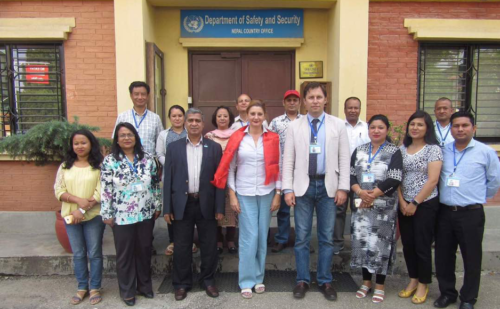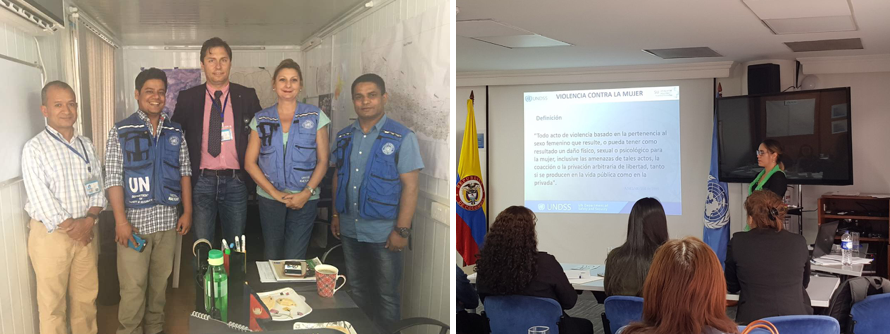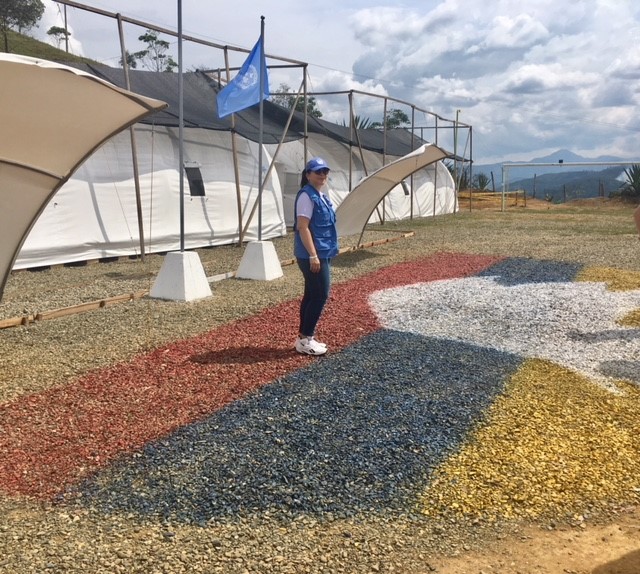This website uses cookies so that we can provide you with the best user experience possible. Cookie information is stored in your browser and performs functions such as recognising you when you return to our website and helping our team to understand which sections of the website you find most interesting and useful.

Our Vision
Protecting the people who work for a better world.
Our Mission
We provide professional safety and security services to enable the United Nations to deliver its programmes globally.
We coordinate safety & security in the field

We work with organizations of the United Nations Security Management System (UNSMS) on issues related to safety and security. This means making sure all programmes can take place as safely as possible. UNDSS personnel deal with issues ranging from everyday incidents such as petty crimes to complex targeted attacks on United Nations convoys or offices.
We provide security at Offices Away from Headquarters
Our Division of Headquarters Security and Safety Service (DHSSS) is responsible for the management of safety and security operations at 11 major duty stations, comprising some 1,500 security personnel. These services provide security for 36,000 staff members (plus 58,000 dependents) and approximately 3 million visitors annually, including more than 1,000 VIPs (Heads of State and Government). Examples of security services provided include access control, premises guards, close protection, building assessment and much more.

We manage security at major conferences
We provide security management services at events around the world organised by UN organizations, including major events that attract thousands of delegates and participants.
We analyse threats and risk
At the operational level in the field, Principal Security Advisers, Chief Security Advisors and Security Advisors in the field, assisted by their staff and specialized analysts, lead the main process to analysis threats and risks and recommend counter measures, through the Security Risk Management process.
We support peacekeeping and regional sections
Our Peacekeeping Operations Support Section (POSS) and the four Regional Sections are responsible for the day-to-day management of security operations in the field in missions, countries and areas under their responsibility.
We collaborate with NGOs
Saving Lives Together (SLT) is a framework that aims to enhance security collaboration in the field between the UN and (I)NGOs. Through SLT, the UN and the humanitarian community work together to collect, analyse and share critical information on security-related issues on the ground in countries where we work.
We advise on physical security
The UN works in buildings and premises all over the world, often in dangerous, high-risk locations. With direct attacks again UN premises on the rise, our Physical Security Unit provides expertise on physical protection to UNDSS security officials.
We have a decision-making framework
Our policies, known as UNSMS security policies, support all decision-making in relation to security in the field. The policies guide the formulation of all of the advice provided by UNDSS personnel: from what entry procedure to use, to what escort to provide to programming.
The nature of our work
Our personnel perform a large range of functions, from ensuring the security of UN compounds, providing close protection services, and investigating incidents, to providing training on safety and security policies and procedures. Our staff identify security trends, develop security plans and ensure crisis preparedness.
There are many types of role within UNDSS, requiring a diverse set of knowledge, skills and experience. These roles can be broadly grouped into three career streams, all of which are essential for the successful implementation of our mandate:
1. Security Operations: This stream is made up of specialised functions that require specific technical skills sets, knowledge and experience. Examples include Policy Officers, Threat Analysts, Physical Security Specialists, Aviation Risk Management, Training, and Fire Safety..
2. Specialist Security Operations Support: This stream includes core safety and security functions related to the Department’s operations. Examples of Security Operations functions include Security Management & Advisory Services, Uniformed Security, and Close Protection.
3. Executive support: This stream includes roles that exist across the UN system, such Budget & Finance, HR, Logistics, Communications etc.

We encourage growth & professional development
We value professional growth and staff mobility at UNDSS. During the course of their careers with UNDSS, our personnel can choose to remain within a particular career stream, but they will also be encouraged to gain experience in other streams to build the knowledge, skills and experience required for management and leadership roles. We endeavour to give our personnel the greatest opportunities for career development to realise their potential.
Strength in diversity
We are fully committed to increasing both geographical and gender representation throughout our workforce across all levels and categories. Diversity contributes to more effective decision-making and problem-solving by providing a range of perspectives, expertise, and a more robust process for critical evaluation. It is also reflective of our global client base, their needs, and the membership of the United Nations system that we serve.
With respect to gender, we strive to:
- Establish an inclusive and enabling organizational culture free from gender bias and discrimination;
- Improve greater gender balance at all levels in UNDSS; and
- Strengthen resilience through improved strategic planning for gender-responsive operations

Name: Laura M. Certuche
Age: 44
Nationality: USA
Organisation: United Nations Department of Safety and Security
Role: Security Coordination Officer
Education: BS in Criminal Justice
What is your background? What did you do/study before working for the United Nations?

Prior to joining the United Nations I was working in private sector security for a large retailer as an “Undercover Store Detective” and concurrently pursuing my Bachelors Degree while being a married mommy of two girls.
What made you decide to apply for your current role?
I was working in Bangkok, Thailand with the Department as the Deputy Chief of the Security and Safety Section and saw the opportunity to become part of our other Division (Division of Regional Operations) where I could use my language skills and my knowledge of the Latin American Region.
What single fact would surprise people the most about you?
I joined the organization in February 1998 as a uniformed security officer at UNHQ.
What first attracted you to the UN?
My desire to learn and expand my experience on an international level.
Whats the best thing about working for the United Nations Department for Safety and Security (UNDSS)?
The people and experiences which have positively impacted on my life.
What are your proudest achievements within your career?
Passing the G to P in first place in my job family.
Nicest fact/surprise about working in a security role?
What we do helps protect those out there trying to help the world. Its like being the protectors of the protectors and it is humbling if you sit back and you ingest it.
What advice would you give other women interested in following in your footsteps?
Go for it!! Do not be scared it will not be easy but if it were easy why bother there would be no sense of achievement.
Could you describe your typical working day/week?
My day begins before arriving in the office, anything could have happened overnight so I check my phone, quickly scan emails and turn on the news while I get ready. Once in the office I actually do all this more carefully and reach out to my colleagues in the field to follow-up on anything we may have been working on. Attending meetings is inevitable but is also a good opportunity to network and touch base. Read reports, I read a lot these days from Security Risk Management documents to Residential Security Measures all the way to budget reports.
What has been your greatest challenge during your career?
To be honest…my desire to always do the best I can do and accept the things I cannot change.
Is there anything about working at UNDSS, or at a specific location that you did not expect when starting?
I expected to learn every step of the way no matter where I went or where I was but I really appreciate that this has molded me, taught me, and as a parent I have in turned shared what I have learned with my children hopefully giving them additional insight they may never witness with their own eyes in order to make them better citizens of the world.
What do you believe is/are the most important skill(s) needed for an international career in your job field?
Communication and respect. I believe you need to know how to communicate effectively and confidently but also with humility and respect. You need to respect not only yourself, but the role you have been entrusted with and everyone around you because its working together that allows us to be successful.
The UN Secretary-General has launched a strategy on gender parity. What are your thoughts on this as a woman working in security?
I believe gender parity works both ways and what we witness more in security is gender inequality. I personally recall a situation early on in my professional career where a boss I once had made a statement that it would not be good to have two female supervisors in charge of the same unit. Although he was my boss I challenged him and expressed my surprise at this statement. He quickly backtracked but the cards were on the table and I saw his hand. Jump ahead 14 years later I haven’t had that experience again, at least not that blatantly, but also because I believe the colleagues are more conscience of this global initiative and because we are all working toward the same goals. My gender, anyone’s gender, should not be what defines us it is simply us. I am a woman, proud of it, I am a mother, a wife, a daughter, a sister, a friend and your colleague.

